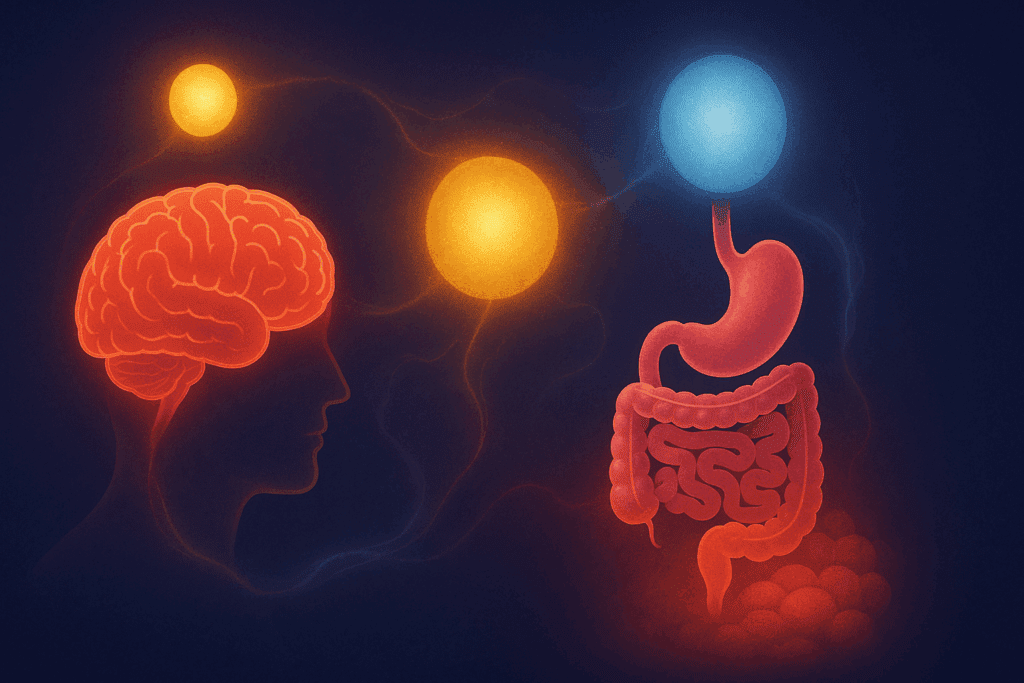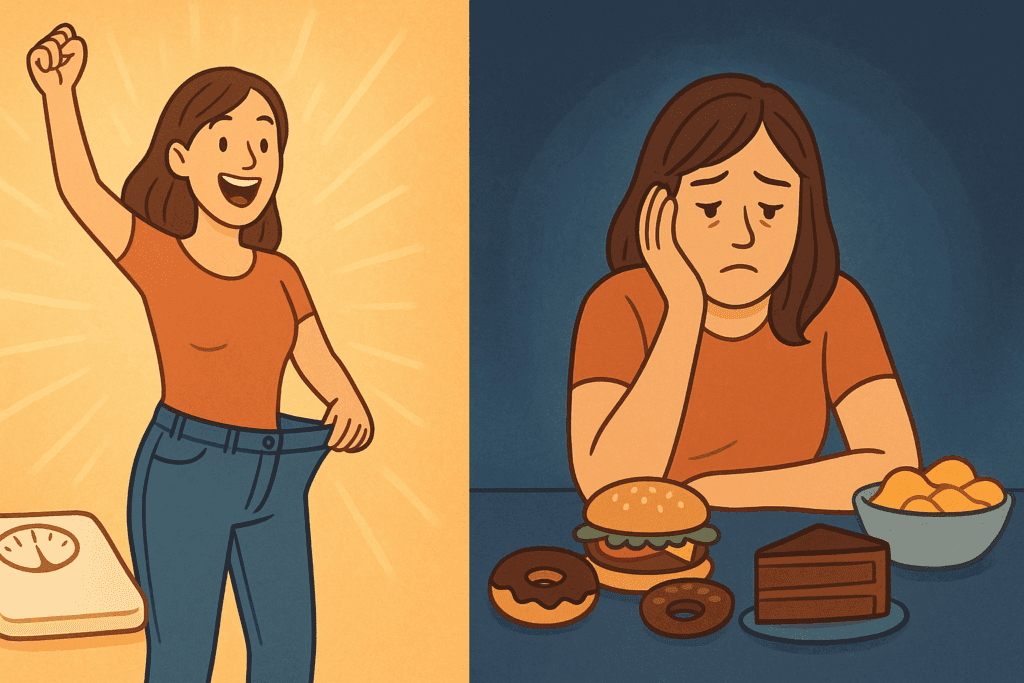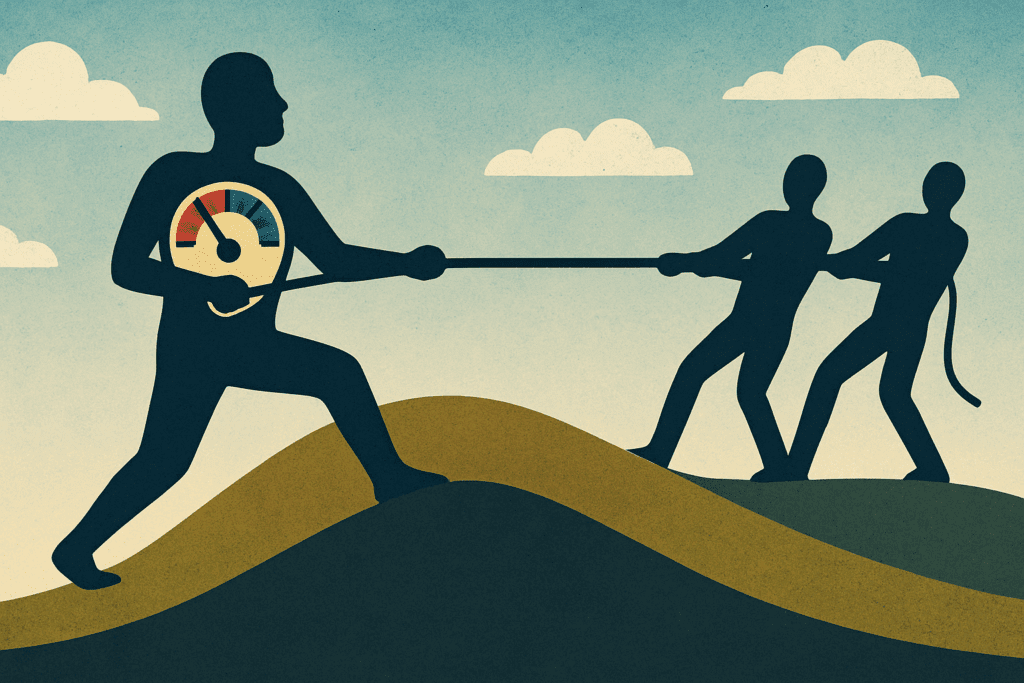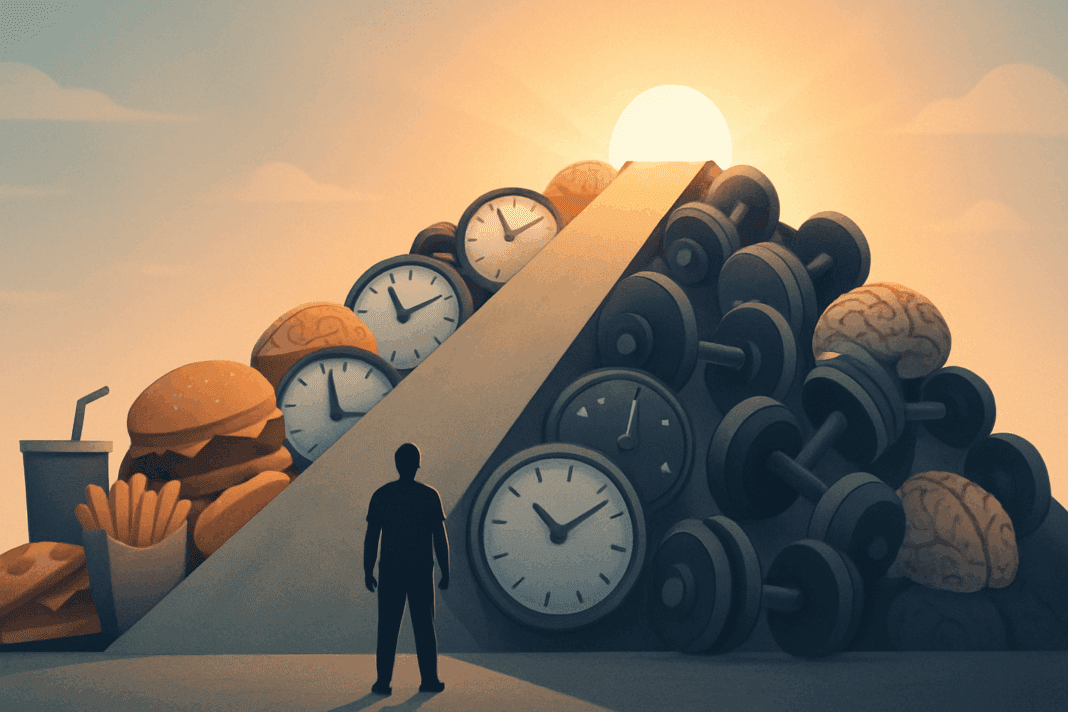For many people, the pursuit of weight loss can feel like a relentless uphill battle. Despite efforts to eat well, exercise regularly, and follow expert advice, the scale often refuses to budge—or worse, it creeps back up after hard-earned progress. This recurring frustration leads many to ask, why is losing weight so hard? It’s a question that touches not only on personal willpower but on deeply complex biological systems, psychological patterns, environmental influences, and long-term lifestyle habits. Understanding why weight loss is so difficult requires more than motivation; it requires a deeper look into the science of how our bodies regulate energy, fat storage, hunger, and metabolism.
You may also like: Expert-Backed Weight Loss Tips for a Healthier Lifestyle: What You Need to Know for Long-Term Weight Control and Wellness

Understanding Metabolism: Why It Matters More Than You Think
Metabolism plays a central role in determining how easily or how stubbornly weight is lost. When people wonder why is losing weight so hard, one of the first culprits is often metabolic rate. Metabolism refers to the chemical processes that convert food into energy. While resting metabolic rate (RMR) varies from person to person, it is largely influenced by genetics, age, sex, body composition, and activity level. Muscle tissue burns more calories than fat even at rest, which is why strength training is often recommended to support fat loss.
However, the challenge goes beyond baseline metabolic differences. When someone enters a calorie deficit to lose weight, the body responds by slowing down metabolism to conserve energy—a process known as metabolic adaptation or “adaptive thermogenesis.” This is one of the most frustrating aspects of long-term weight loss and a key reason why losing weight is so difficult. As the body senses a drop in caloric intake, it recalibrates to burn fewer calories, making it increasingly harder to continue losing weight at the same rate.
Further complicating the issue is the tendency for the body to become more efficient with movement during weight loss. Activities that once burned a significant number of calories begin to require less energy. Over time, this means that even consistent exercise routines yield diminishing returns unless they are adjusted. These physiological adaptations are not flaws but evolutionary safeguards meant to prevent starvation. Unfortunately, in today’s environment of food abundance, they often hinder our attempts to reach and maintain a healthy weight.

The Hormonal Puzzle: How Your Body Resists Weight Loss
Hormones are another crucial piece of the puzzle. They govern hunger, satiety, stress, and energy regulation. Among the key hormones involved in weight loss struggles are leptin, ghrelin, insulin, cortisol, and thyroid hormones. Leptin, which is produced by fat cells, signals satiety to the brain. As body fat decreases during weight loss, leptin levels fall, resulting in increased appetite and decreased energy expenditure—a double blow that helps explain why losing weight is so hard even when following a diet plan.
Ghrelin, often referred to as the “hunger hormone,” also increases as weight is lost, intensifying the urge to eat. This hormonal interplay can make sustained calorie restriction not only physically difficult but emotionally exhausting. For individuals with insulin resistance, such as those with type 2 diabetes or metabolic syndrome, fat burning becomes even more impaired, further highlighting why losing weight is so difficult for many people despite their best efforts.
Cortisol, the stress hormone, adds another layer of complexity. Chronic stress and poor sleep quality elevate cortisol levels, which have been shown to promote fat storage, particularly around the abdomen. This stress-related weight gain is not simply a matter of willpower but a hormonal response that can override even the most disciplined eating habits. The thyroid gland also plays a key role, as it regulates metabolism through hormones like T3 and T4. An underactive thyroid can significantly slow down metabolic rate, making weight loss exceedingly difficult without medical intervention.

Why Dieting Alone Often Backfires in the Long Run
Dieting, particularly extreme or restrictive diets, can create a cycle that undermines long-term success. While short-term weight loss is often achievable through calorie restriction, these results rarely last. One of the main reasons why it is so hard to lose weight and keep it off is the phenomenon of “weight cycling” or yo-yo dieting. When people repeatedly lose and regain weight, their bodies may become more efficient at storing fat, and their metabolic rate can decline even further over time.
Moreover, many diets focus solely on calorie intake without addressing nutritional quality or behavioral sustainability. This leads to a reliance on willpower rather than long-term lifestyle change. Once the diet ends, individuals often return to old habits, which are reinforced by physiological cravings, emotional eating, and environmental triggers. The brain’s reward system also plays a role here, as highly processed foods can create a cycle of craving and temporary pleasure that is difficult to resist. This neurobiological reinforcement contributes to why losing weight is so difficult for people living in food environments saturated with convenient, hyper-palatable options.
In addition to the biological responses to dieting, there are psychological consequences as well. Chronic dieting can lead to increased anxiety around food, feelings of failure, and a diminished relationship with eating. These emotional burdens create barriers that extend far beyond food choices, influencing motivation, self-esteem, and long-term health behaviors. As such, a more effective and compassionate approach to weight loss must include mental and emotional health support as a foundational pillar.

Set Point Theory and the Body’s Weight Regulation System
Another scientifically grounded reason why losing weight is so hard stems from the body’s weight regulation system, often referred to as the set point theory. This theory suggests that each person has a genetically determined weight range that the body strives to maintain. When weight deviates too far below this range, the body initiates counter-regulatory mechanisms such as increased hunger, lower energy expenditure, and hormonal shifts designed to bring the weight back up.
While the set point is not necessarily fixed for life, it is resistant to change, especially in the downward direction. This means that after weight loss, the body may respond as though it is being starved, even if the person is still in a healthy range. These physiological signals persist long after dieting has ended, often for months or even years, which contributes to the overwhelming sense that the body is “fighting back.”
Furthermore, recent research has suggested that long-term weight loss maintenance requires not just behavioral vigilance but biological recalibration. This includes resetting the body’s metabolic and hormonal patterns through sustained, moderate lifestyle changes rather than extreme dieting. Understanding the persistence of the set point mechanism can help explain why losing weight is so difficult for individuals who experience rapid regain despite continued efforts to eat well and stay active.

Environmental and Lifestyle Influences That Sabotage Progress
Beyond biology, the environment in which we live significantly influences weight regulation. From sedentary jobs to time-scarce schedules, modern life often prioritizes convenience over health. The constant availability of high-calorie foods, aggressive food marketing, and oversized portion norms make it incredibly easy to consume more energy than needed. These external factors are not simply temptations; they are systemic pressures that make healthy choices more difficult to sustain.
In many cases, social dynamics play a role. Cultural expectations, family traditions, and peer behaviors can either support or sabotage weight loss goals. Eating out frequently, social drinking, and celebratory meals often involve high-calorie foods and large portions. Individuals trying to lose weight must not only manage their own habits but also navigate a social landscape that may not align with their health goals. These social pressures offer insight into why it is so hard to lose weight even for those with strong personal motivation.
Sleep, another often overlooked factor, profoundly affects hunger-regulating hormones like ghrelin and leptin. Inadequate or poor-quality sleep has been linked to increased appetite and reduced impulse control, both of which make weight loss harder. Add to that the reduced energy for exercise and meal planning, and it becomes clear that even small disruptions in routine can ripple into larger setbacks. These real-world challenges create an environment where maintaining a calorie deficit becomes far more complicated than the simple math of “calories in versus calories out.”

Emotional Eating, Mental Health, and the Weight Loss Journey
Emotions play a powerful role in eating behaviors, and understanding their impact is key to grasping why losing weight is so hard. Emotional eating, which involves consuming food to cope with stress, boredom, sadness, or anxiety, is a deeply ingrained behavior for many individuals. In times of emotional distress, food often serves as a source of comfort, distraction, or temporary relief. This relationship with food is not merely psychological; it is reinforced by hormonal shifts and neurological pathways that reward comfort eating.
Mental health conditions such as depression, anxiety, and binge eating disorder further complicate weight management. These conditions often disrupt sleep, appetite regulation, and daily activity levels—all of which are essential for weight control. Unfortunately, the stigma surrounding both mental health and obesity can prevent individuals from seeking help, perpetuating cycles of shame and isolation. This emotional burden makes it more difficult to engage in the sustained, mindful behaviors necessary for long-term success.
Moreover, perfectionism and all-or-nothing thinking frequently derail progress. When people slip up on their eating plan, they often interpret it as a failure rather than a natural part of the process. This mindset can lead to binge episodes or complete abandonment of the goal. Cultivating self-compassion and resilience is essential to navigating the inevitable ups and downs of the weight loss journey. Emotional regulation and psychological flexibility, therefore, are not just helpful—they are crucial to lasting success.
Sustainable Strategies for Long-Term Weight Management
Given all of these challenges, the question becomes not just why is losing weight so difficult, but how can individuals approach it more sustainably? The first step is shifting from a weight-centered mindset to a health-centered one. Rather than focusing solely on the scale, it is more productive to prioritize behaviors that improve metabolic health, increase energy, and enhance quality of life. This includes eating nutrient-dense foods, incorporating enjoyable physical activity, managing stress, and getting adequate sleep.
Behavioral consistency is more important than intensity. Small, sustainable changes practiced over time yield greater results than extreme regimens that are quickly abandoned. For example, walking regularly, preparing home-cooked meals, and getting sufficient hydration can have a greater cumulative impact than following a strict diet that is unsustainable. Setting realistic expectations and celebrating non-scale victories—like improved energy levels or better sleep—can help maintain motivation.
Support systems also matter. Whether it’s a registered dietitian, a therapist, a fitness coach, or a community group, having accountability and guidance increases the likelihood of success. These professionals can help tailor plans that align with individual needs, goals, and health conditions, offering both expertise and emotional support. Most importantly, they help individuals move beyond the cycle of self-blame by acknowledging the multifactorial nature of weight management.
Frequently Asked Questions: Why Is Losing Weight So Hard?
1. Can long-term dieting actually make weight loss harder over time?
Yes, prolonged or repeated dieting can make weight loss more challenging by training the body to become metabolically more efficient. This means that after cycles of weight loss and regain, your body may burn fewer calories at rest, a phenomenon known as “adaptive thermogenesis.” Over time, this metabolic slowdown contributes to why is losing weight so hard even when caloric intake is reduced. Additionally, chronic calorie restriction may alter hormone balance, reduce lean muscle mass, and disrupt appetite regulation—all of which further complicate efforts to lose fat. Addressing this requires building muscle, nourishing the body properly, and focusing on long-term, sustainable changes rather than cycles of deprivation.
2. How does your brain influence why losing weight is so difficult?
The brain plays a far larger role in weight regulation than most people realize. When you reduce food intake, your hypothalamus senses this drop and initiates responses that increase hunger while decreasing energy expenditure. This biological drive to eat more is deeply rooted in survival instincts, not personal weakness. The brain also responds to rewarding foods—especially those high in sugar and fat—by activating the dopamine system, reinforcing habits that can override willpower. These neurochemical and behavioral pathways offer a deeper understanding of why is it so hard to lose weight in a modern environment saturated with convenience foods.
3. Is weight loss harder for some people because of their body’s fat distribution?
Yes, where your body stores fat plays a critical role in your ability to lose it. Visceral fat, which is stored around the organs in the abdominal cavity, is more metabolically active and often responds faster to diet and exercise than subcutaneous fat stored under the skin, especially in areas like the hips and thighs. This distribution is largely influenced by genetics, hormones, and sex—factors beyond conscious control. Women, for example, tend to hold more subcutaneous fat due to estrogen, which helps explain why is losing weight so difficult for some even when they’re making consistent efforts. Individualized approaches that account for body composition are essential for sustainable progress.
4. How do medications affect weight loss efforts?
Many commonly prescribed medications can impact metabolism, appetite, and fat storage. Antidepressants, corticosteroids, insulin, beta blockers, and even antihistamines can lead to weight gain or make fat loss more difficult. This factor is often overlooked when people ask why is losing weight so hard despite maintaining a healthy lifestyle. If weight gain occurs after starting a medication, it’s essential to consult a healthcare provider rather than stopping the medication abruptly. In some cases, alternative treatments with fewer metabolic side effects may be available, allowing for better alignment between medical needs and weight management goals.
5. Are there genetic reasons why some people find weight loss nearly impossible?
Absolutely—genetic predisposition plays a significant role in body weight regulation, appetite, fat storage, and energy expenditure. Some individuals carry gene variants that make them more prone to insulin resistance, slower metabolism, or a stronger preference for calorie-dense foods. While genes do not doom a person to obesity, they help explain why is it so hard to lose weight for certain people even when they follow the same plan as others. However, gene expression can be modified through lifestyle changes, including physical activity and dietary choices, offering hope for improvement despite genetic tendencies.
6. Does age really make a difference in how difficult it is to lose weight?
Yes, age brings hormonal changes, muscle loss, and slower metabolism—all of which affect the body’s ability to shed pounds. After age 30, muscle mass begins to decline unless efforts are made to preserve it through resistance training. Since muscle burns more calories than fat, this decline directly contributes to why is losing weight so hard in middle age and beyond. Additionally, hormonal shifts such as declining testosterone in men and estrogen in women can increase fat storage, especially in the abdominal area. Strength training, balanced nutrition, and consistent sleep routines become even more important with age.
7. How does chronic inflammation affect fat loss?
Chronic low-grade inflammation, often seen in individuals with metabolic syndrome, autoimmune diseases, or poor gut health, can interfere with the body’s ability to burn fat. Inflammatory markers such as C-reactive protein (CRP) and interleukins have been linked to insulin resistance and increased fat storage, especially around the belly. This state of internal stress contributes to why is losing weight so difficult for people with underlying inflammatory conditions. Incorporating anti-inflammatory foods like leafy greens, omega-3 fatty acids, and fermented foods, along with reducing ultra-processed meals, can help improve outcomes over time.
8. Why does sleep matter so much when trying to lose weight?
Poor sleep interferes with the balance of key hunger hormones such as ghrelin and leptin. When sleep is restricted, ghrelin levels rise (increasing hunger), while leptin levels drop (reducing satiety), making it harder to resist high-calorie foods. Lack of restorative sleep also elevates cortisol, which promotes fat storage, especially in the abdomen. These disruptions shed light on why is it so hard to lose weight for people with irregular schedules or sleep disorders. Prioritizing quality sleep can make a measurable difference in metabolic regulation and weight control, often as much as diet and exercise.
9. Are there cultural or social reasons why weight loss is harder in some communities?
Yes, cultural norms and socioeconomic factors significantly impact dietary patterns, access to healthy foods, and opportunities for physical activity. In some communities, high-calorie meals are central to family traditions or social gatherings, and opting out can lead to social pressure or exclusion. Economic limitations may restrict access to fresh produce or gym memberships, leaving individuals reliant on convenience foods. These systemic and cultural barriers are a major reason why losing weight is so difficult for some populations, and effective interventions must address more than individual choices—they must include community support, education, and accessibility.
10. What does current research suggest about future treatments for weight loss?
Emerging treatments like GLP-1 receptor agonists (e.g., semaglutide) offer new hope for individuals struggling with obesity by targeting the brain’s appetite centers and improving insulin sensitivity. Personalized medicine—using genetic testing to tailor nutrition and exercise plans—is another promising frontier. Research is also exploring how the gut microbiome affects energy balance and fat storage, opening the door to targeted probiotic therapies. These advances are being driven by deeper scientific inquiry into why is losing weight so hard and how we can overcome these barriers with more precise tools. While no treatment is a magic solution, the future of obesity care is becoming more personalized, evidence-based, and holistic.
Final Reflections: Why Losing Weight Is So Difficult and What You Can Do About It
Weight loss is not simply a matter of calories and willpower; it is a biologically, psychologically, and socially complex endeavor. When asking why is it so hard to lose weight, the answer lies in an intricate web of metabolic adaptations, hormonal responses, emotional coping mechanisms, and environmental pressures. Each of these factors interacts in ways that make long-term fat loss more challenging than most diet programs acknowledge. What works for one person may not work for another, and setbacks are not signs of failure but reflections of how intricately the human body protects its weight balance.
Still, understanding these complexities can offer a sense of empowerment. By recognizing the real reasons why losing weight is so hard, individuals can approach the process with greater compassion, patience, and strategy. Sustainable success does not come from punishing diets or extreme exercise, but from embracing long-term habits that support both physical and emotional well-being. When science, self-care, and support come together, meaningful progress becomes not only possible but maintainable.
Further Reading:
Why It Really Is Harder for Women To Lose Weight (and What To Do About It)
Does your body really fight against weight loss? This scientist explains why the research says no.


